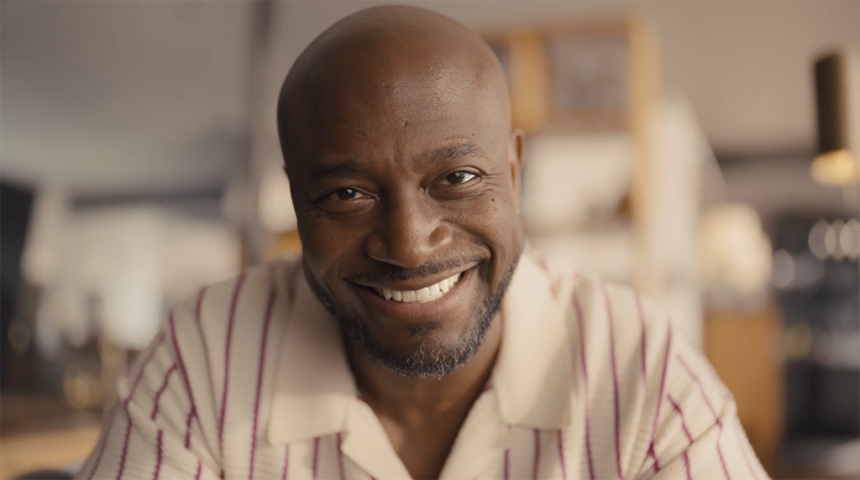In addition to rising rates of mental illness, researchers have found a spike in sleep disorders since the pandemic started. Two in three Americans are now reporting they are sleeping more or less than desired, according to the American Psychological Association.
Raising awareness of these disorders — and trumpeting the importance of sleep to physical and mental health — are the main goals of a partnership between actor Taye Diggs and Idorsia Pharmaceuticals. Diggs, known for his roles in Broadway musicals (Rent, Hedwig and the Angry Inch) and movies (How Stella Got Her Groove Back), is serving as a patient ambassador for insomnia drug Quviviq and sharing his own experiences with insomnia.
MM+M spoke with Diggs on his sleep struggles, the relationship with Idorsia and why his celebrity can help reach patients. This transcript has been lightly edited for length and clarity.
MM+M: When did your struggles with insomnia begin?
Taye Diggs: Up until recently, I thought insomnia was something that was far away from me. It took me a while to acknowledge that it was something that I needed to deal with.
It started out due to my lack of sleep when my child was a newborn. I didn’t know how long he would sleep, when he would fall asleep or when I would wake up. If I had to work the next day, I would get this very strong pang of anxiety, just not knowing how much sleep I would get, knowing that I had to show up and perform. So from that point on, it just grew.
It progressively got to the point where, in the past few years, I became alright with either getting no sleep at all or around two to four hours of sleep a night. As you can imagine, I was turning to energy drinks, caffeine and supplements for working out, pre-workout shakes and whatnot.
It got to the point where it was too much — and finally my son would start commenting on my behavior with him. I realized I needed to deal with this because I knew my disposition was directly linked to the fact that I just wasn’t getting enough sleep.
I went to a doctor, which was something that I normally don’t do, but I jumped that hurdle and he introduced me to Quviviq. After months of looking at some other options, that was the key that opened up the door. I was able to finally fall asleep and stay asleep.
I had no idea how much of a relief it would be. It was almost as if I turned into the person that I was back in college or in high school, where I was able to give 100% without even trying. I was ashamed at the percentage of myself that I was giving before, not knowing that I could give more. That’s what I’m hoping to put out there to others: That it doesn’t have to be that way.
I think there’s a stigma attached to sleep aids. You feel like you’re doing something that is bad for yourself, when in reality you’re doing something that your body needs.
How did the partnership with Idorsia come about?
This isn’t something that I normally do. But this affected my life in such a way that I just wanted other people to know that there is a light at the end of the tunnel. I had gotten so used to living a certain way that I don’t want to even say I gave up hope; I didn’t think there was hope. I got used to a certain amount of energy drinks and a certain amount of wine, and I realized that I would only reach a certain point when it came to my performance at work, in my relationships and just in life.
But once I opened my purview and saw this doctor and took the advice that he gave, it completely shed light on a life that — it sounds overdramatic — I didn’t think existed. That resonated strongly with me, just as an actor and loving what I do and finding that love again.
What do you hope will result from your work on this campaign?
I think it’s very important to stress that everybody has a different situation and that we need to utilize our doctors. In this day and age, everybody tries to Google things and that’s fine and good. But it’s important to make sure you get the help from a professional and allow them to guide you through whatever situations you may be struggling with.
There were times when I had insomnia that I felt like I was someone else. Literally, they use sleep deprivation as a form of torture. That’s how serious it can be. It’s important that people know about it and that you give your body what it needs.
How do you see your role in connecting with people dealing with insomnia and raising awareness of the issue?
I’m an actor, but I’m also a fan. Whenever I hear someone who I hold in high esteem, or other actors, is suffering from something that I’m dealing with as well, it makes me feel closer to them and it makes me feel it’s a bit easier for me to deal with. If someone who I look up to is dealing with something that I’m dealing with, then I don’t feel so bad.
Especially if there’s some sort of a solution, then you feel it’s more accessible. That’s what I’m hoping to prove to people. On the surface, insomnia is a seemingly simple situation — but if it’s not given the proper attention, who knows what could happen. Once you make the decision to deal with it, see a doctor and handle what needs to be handled, you can have a different outcome. And that outcome can possibly change your life.







